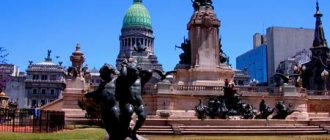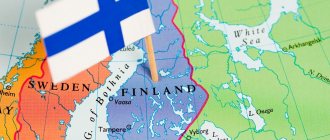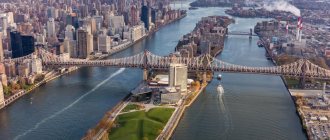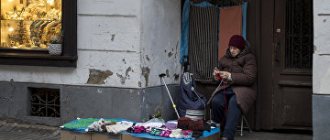Life in Montenegro 2021: average salary, prices and taxes
The state of Montenegro, located on the coast of the Adriatic Sea, attracts more and more tourists from the CIS countries every year. However, life in Montenegro is of interest not only to travelers, but also to potential immigrants who dream of a quiet existence near the sea. This is how one can describe the way of life of Montenegrins: leisurely, calm and ability to enjoy life. But before you decide to take such an important step as moving to another country, you should familiarize yourself with all the advantages and disadvantages of your final destination.
Economy and standard of living
The economy and standard of living in Montenegro are characterized by stable growth, which in turn affects the improvement of the quality of life: the tourism industry brings the country more and more profit every year, the real estate market is developing, and the labor market is replenished with foreign specialists. This is also facilitated by good ecology, thanks to which the average age of residents of Montenegro is 75 years.
When talking about how much it costs to live in Montenegro, you should keep in mind that the cost of living and food here is much lower than in other European countries. And all because the economy of Montenegro, compared to the countries of the European Union, is weaker and the standard of living in the country is generally lower. However, the country's government is trying to introduce European standards into all management systems in Montenegro. In recent years, the state has seen a rapid increase in wages, and accordingly, the cost of living in Montenegro in 2021 is also growing.
The average salary of Montenegrins in 2021 was 480 euros. At the same time, those living in Montenegro claim that a family of three needs an income of at least 1,000 euros per month for a comfortable existence.
Spending
Accommodation in Montenegro is cheaper than in other European countries. This is especially true when it comes to spending on food: a full food basket for a family of 3 people for a week costs about 60 euros. Moreover, all products in it are environmentally friendly and healthy.
A special expense item in Montenegro is utilities. You have to pay more for electricity and water here than in Russia. In addition, Montenegrin houses do not have a unified heating system, so they have to spend extra money on furnishing their homes for the winter season.
Renting or buying an apartment is an inevitable expense for any immigrant. Monthly accommodation in a rented apartment costs approximately 250 euros per month, subject to long-term cooperation with the property owner. Prices for apartments in Montenegro are at a lower level than in other European countries.
Preschool and school education in Montenegro is free. Only those who do not have a borawak, a document giving the right to temporary residence in the country, pay for the use of medical services.
Average prices in the country
If you are interested in how much money you need for food per day in Montenegro, then on average 10-20 euros per day is enough for one person - it all depends on the choice of products and catering establishments. In addition, you should take into account various household expenses: travel, housing rent, entertainment. If you intend to visit Montenegro as a tourist, you also need to take into account the costs of excursions (from 25 to 45 euros per excursion). On average, one day of stay in Montenegro will cost approximately 25 euros per person, but if you are a tourist, then it is advisable to double or even triple this amount. It should be borne in mind that prices for accommodation in Montenegro differ depending on the location of the city: the closer to the resort area, the higher they are.
Average cost of goods and services
The cost of household goods and services in Montenegro is comparatively lower than in the EU countries, but significantly higher than in the CIS countries. Average prices for some goods and services are shown in the table:
| Type of service | Prices in euros |
| Traveling on public transport | 3 |
| Car parking (per day) | 0,75 |
| Theater ticket | 7 |
| Car rent | 25 |
| Toothpaste | 2 |
| Washing powder | 1,75 |
| Dish detergent | 1,5 |
| Cigarettes | 1,75 |
| Sneakers | 85 |
| Men's leather shoes | 90 |
Cost of food
Products in Montenegro are environmentally friendly and of high quality. At the market, products are a little more expensive than in supermarkets, but here they are fresher and of better quality. The average cost of basic food products is shown in the table:
| Products | Prices in euros |
| Chicken eggs 10 pcs. | 1,5 |
| 1 kg beef | 6 |
| 1 kg poultry | 3,5 |
| 1 kg fish | 8,5 |
| 1 kg of vegetables (cabbage, carrots, cucumbers) | 1,5 |
| 1 kg rice | 1,5 |
| 1 liter juice | 1 |
| Tea (100 g) | 1,5 |
What kind of work can you expect?
Montenegro, washed by the Adriatic Sea, attracts many holidaymakers in the summer, so at this time of year it is quite easy to find work in the tourism sector. The most popular vacancies are cooks, bartenders, waiters, maids, massage therapists, and drivers.
Installers, engineers and builders can also find work in Montenegro. It should be noted that Montenegrin employers willingly hire certified specialists who can find application for their knowledge as translators, in the field of information technology, in science, business management, etc. The average salary in Montenegro is about 480 euros per month, the minimum is 160 Euro.
Standard of living in Montenegro
Residents of Montenegro can boast of a fairly high standard of living, which can easily be compared with that of Europe. The main reason is the large number of tourists. Prices for real estate, food and vacations here are much lower than in many nearby countries. And wages are high, especially in big cities.
Many people make money from tourism by providing various services, so it is difficult to determine the amount of average earnings per season. For a normal life, a family of several people needs 1 thousand euros per month. Life in Montenegro is really inexpensive. One person spends no more than 20 euros on food.
The cost of food is as follows (prices in euros):
- potatoes – up to 0.80;
- cucumbers – 1;
- carrots – 1.5;
- sausages – 7-15;
- bread – 1;
- milk – 1-1.20;
- wine – 2-5.
Important
Travel by public transport is 3 euros, and the daily cost of a parking space for a car is about 1 euro.
The cost of renting an apartment depends on the locality. Such housing will cost approximately 200-300 euros per month (“utilities” – 50-60 euros). Housing here is expensive. For an apartment (40 sq. m.) you need to pay at least 40 thousand euros (60 thousand - near the beach). Internet and mobile communications cost Montenegrins another 50 euros.
Education system
Anyone who will live in Montenegro with children is interested in the question of what the local educational system is like. It should be noted that schools in Montenegro are divided into two levels: primary (9 years) and secondary (3-4 years). Education in educational institutions of both levels is free.
At the same time, attending primary school is compulsory, and you can enroll in secondary school if you wish.
As for higher education in Montenegro, it can be obtained in both public and private educational institutions. Most of them are focused on the tourism sector, since this industry is the most profitable in the country. The main condition for admission to a higher educational institution is knowledge of the state language. For foreign students, there are preparatory courses, upon completion of which a certificate is issued indicating the level of proficiency in the Montenegrin language.
Real estate market
Real estate prices in Montenegro vary significantly depending on the city or region of the country. The lowest housing prices are in cities far from the sea, for example, in Niksic.
Buying a property
The cost of 1 square meter of housing in the capital of Montenegro, Podgorica, is approximately 1,750 euros in the central area and 1,000 euros in the bedroom area. In the center of the resort town of Budva, an apartment can be purchased at a price of 3,200 euros per 1 square meter, and in a residential area - for 1,800 euros. Read more about real estate in Budva here. In the city of Niksic, apartments are sold at a price of 550 euros per 1 sq. m. m in the central area and 700 euros per 1 sq. m in the bedroom.
Rental Property
If we take, for example, a one-room apartment, then in Podgorica such housing can be rented for 300 euros per month, in Budva - for 350 euros, and in Niksic - for 150 euros. Renting a three-room apartment is slightly more expensive: the average rent in Podgorica is 500 euros per month, in Budva - 600 euros, in Niksic - 200 euros.
Salaries, average and by profession, in Montenegro
Montenegro is a beautiful and hospitable resort for tourists. But local residents care about the availability of work and the level of wages. As for a European state, salaries in Montenegro are very good. And if you take into account the Montenegrin climate and low prices, then this country may be ideal for employment.
Standard of living in Montenegro
Residents of Montenegro can boast of a fairly high standard of living, which can easily be compared with that of Europe. The main reason is the large number of tourists. Prices for real estate, food and vacations here are much lower than in many nearby countries. And wages are high, especially in big cities.
Many people make money from tourism by providing various services, so it is difficult to determine the amount of average earnings per season. For a normal life, a family of several people needs 1 thousand euros per month. Life in Montenegro is really inexpensive. One person spends no more than 20 euros on food.
The cost of food is as follows (prices in euros):
- potatoes – up to 0.80;
- cucumbers – 1;
- carrots – 1.5;
- sausages – 7-15;
- bread – 1;
- milk – 1-1.20;
- wine – 2-5.
The cost of renting an apartment depends on the locality. Such housing will cost approximately 200-300 euros per month (“utilities” – 50-60 euros). Housing here is expensive. For an apartment (40 sq. m.) you need to pay at least 40 thousand euros (60 thousand - near the beach). Internet and mobile communications cost Montenegrins another 50 euros.
Average and minimum wage
When compared with other European countries, the average income of Montenegrin citizens is slightly lower. But thanks to low prices, this is enough to live on. Minimum salaries start from 120-150 euros. The average salary in Montenegro in 2021 is 450-500 euros.
Salary by profession
An ordinary resident of Montenegro can count on both the minimum and average wages. The “minimum wage” is received by unskilled workers or students working part-time. The average salary in 2021 for a teacher or educator does not exceed 400 euros. Representatives of “elite” professions (doctors, lawyers) receive slightly more.
The most in-demand professions during the tourist season remain:
- waiters, bartenders;
- animators;
- translators;
- tour guides.
Their average salaries are higher and often reach 2-3 thousand per month. Representatives of various construction specialties, including electricians, mechanics, and assemblers, have good salaries. Such an employee can easily count on earning above average, that is, receiving 600-700 euros per month. There is really a lot of construction here, so both foreigners and locals can find work in construction.
Unemployment rate
Despite the availability of jobs, there is a certain level of unemployment here. As of 2021, it reaches almost 19%. The unemployment rate is slightly higher (20%) in Greece, which recently experienced an economic crisis. For comparison, in Italy these figures barely exceed 11%, in Germany – 3%, and in Bulgaria – 6%.
Social package
Pensions here are among the highest among the pension payments of the former republics of Yugoslavia. The average amount of security for a Montenegrin of retirement age is no more than 300 euros. But Bosnia and Herzegovina has established pension payments of no more than 200 euros.
Despite this, Montenegrin pensioners barely have enough to live on. Therefore, they often cannot do without the help of their children and grandchildren. If we compare the Montenegrin pension and payments in other European countries, then such a comparison will not be in favor of Montenegro. Swiss pensioners receive at least 1 thousand 350 euros, and German pensioners - 1 thousand 200 euros.
Tax system
All citizens of Montenegro are required to pay taxes. But the taxation system here is quite loyal to ordinary payers. Legal entities, that is, organizations, do not pay any fees to the state for the first 3 years. But this is only possible when the company operates where it is necessary to improve the economy. The corporate income tax rate is subsequently 9%.
The VAT amount does not exceed 19%. The value added tax on food products is 7%. The amount of income tax for individuals depends on the amount of their income. If the payer receives no more than 720 euros per month, then only 9% is charged. If income is higher, then the income tax rate increases to 15%.
Montenegrins also pay property tax. The maximum rate is 1%. It depends on the purpose of the property and its location. The closer the property is to the coastline, the higher the tax rate will be.
Peculiarities of work mentality
The mentality of Montenegrins is a bit similar to the mentality of Russians. But there are also differences. One of the most basic qualities of the local population is slowness. This is due to the atmosphere of an eternal holiday and the large number of tourists.
But Montenegrins are really in no hurry, which really annoys foreigners. Associated with this is a certain non-obligation of local residents. The promise made by the Montenegrin can be fulfilled in a few days. Although, when it comes to work, then Montenegrins know how to be obliging and do everything without delay.
It’s hard to call local residents hardworking. And people here have obviously never heard of workaholism. Montenegrins are very friendly and this can be seen both in personal communication and in a work environment. They are always smiling, which makes it difficult to know their true attitude.
So-called intermediation for employment is not prohibited here. This is how many Montenegrins get good positions as a lawyer or manager. For foreigners, these vacancies are practically inaccessible, with the exception of unique specialists.
Work for foreigners
Finding a job for a foreigner in Montenegro is not difficult. There are a lot of vacancies for visitors in the service sector. These are waiters, bartenders, drivers. Montenegro is a great country for employment for students. In one tourist season you can not only earn money, but also have a good rest.
There are also many vacancies for certified specialists. Montenegrins provide jobs for engineers, builders, programmers, and translators. Salaries in Montenegro in 2018 for foreigners are from 150 to 500 euros. Highly qualified specialists can earn much more. You can search for work on websites or through friends.
Montenegro is a suitable country for both holidays and seasonal earnings. If you manage to find a good job, you can get a good income and also buy plenty. Many people are thinking about moving here permanently. But then you need to get used to the climate, the leisurely pace of life, national traditions, and holidays.
Entrepreneurial activity
Since the country attracts a lot of tourists from around the world, it is therefore most profitable to open a business in Montenegro in the tourism industry. The practice of leasing yachts and boats, as well as real estate, is widespread in the country; new restaurants and hotel complexes are constantly opening here.
Registration of a company in Montenegro lasts 5 days. Once you receive an identification number, you can begin your activities.
Banking system
There are 11 banks operating in Montenegro. Bank branches and ATMs can be found in every city and town. Bank employees often speak English or Russian, so visitors can easily carry out banking transactions even without knowledge of Montenegrin. To open a savings or deposit account in a bank in Montenegro, a foreigner only needs to have a foreign passport. On weekdays, banks open at 8.00 and close at 19.00; on Saturdays, financial institutions are open until 13.00; Sundays are a day off.
Official language
The official language of Montenegro is Montenegrin. It received official status in 2007 after the country left the State Union of Serbia and Montenegro. Since the official language of the Union was Serbian, the majority of residents now living on the territory of Montenegro still speak it today. The Montenegrin language is part of the Serbo-Croatian language system and is very similar to Serbian, so introducing it as a common language is quite a challenge. In addition, there are no officially defined and approved rules for the Montenegrin language. According to the 2011 census, 37% of the country's residents indicated Montenegrin as their native language (in 2003 this figure was 22%).
Transport system
Due to the mountainous terrain, railway transport in Montenegro is poorly developed. The fact is that to build new railways it is necessary to build tunnels, which today is a rather expensive undertaking for a developing country. The main passenger line starts in Belgrade (Serbia), runs through Podgorica and Bijele Polje and ends in Bar. In addition to the passenger line, there are also two freight lines in Montenegro: Podgorica - Niksic and Podgorica - Shkoder (Albania).
The country also has two international airports: in Tivat and Podgorica. There are regular flights from the capital, and charter flights from Tivat.
To get around the city, you can use traditional forms of public transport: buses and taxis. Passengers are transported between cities by buses and minibuses.
Features of public transport
There is a bus service within the country and between Montenegro and other countries. From the capital and most cities you can easily get to Serbia, Croatia, Turkey, Albania and Kosovo. Double-decker buses are often used for international passenger transport.
Passenger buses follow a schedule. You need to purchase tickets for travel at the ticket office, but if you do not have a ticket and you are forced to stop the bus at a stop, on the highway or near the airport, you can ask the driver about the availability of seats and pay him personally.
It should be borne in mind that bus service is not available in all cities, but only in large ones - for example, in Podgorica.
Taxi Features
In Montenegro, both official (licensed) and unofficial (unlicensed) taxis operate. At the same time, prices in licensed companies are approximately 30% lower than in private ones. Before boarding a taxi, you are required to provide a price list or inform you of the cost of the trip over the phone. Please note that all official taxis in the country are equipped with meters. In addition, licensed taxis are usually represented by cars of the same brand, which cannot be said about cars of unofficial owners, which, moreover, are not in the best condition and age. Although there are also new cars whose drivers pose as official ones. Therefore, always check the numbers of the taxi that arrives with the ones you called.
Work and salaries in Montenegro
Unemployment is around 20 percent, but skilled workers can find work. Engineers, doctors, financiers, accountants, and top managers are in demand. The country has low salaries, the minimum wage is 200 euros. The average fluctuates around 500.
Due to the Balkan country's small population and high level of corruption, local applicants for job openings in Montenegro primarily rely on personal connections. You can also find a job through the World Wide Web, the official website of the state employment agency (www.zzzcg.me). Recruitment announcements are placed in the press, and specialized offices operate in cities.
Read also: Residence permit in Montenegro
The main peak of activity occurs in the summer, when vacationers from abroad come to Montenegro. During the holiday season on the Adriatic coast there is a shortage of waiters, maids, cooks, bartenders, yacht and car washers. Sellers of various goods and animators will also be able to find employment.
Business for Russians
Opening your own business for a foreigner is quite simple. It will take no more than 5 days. It is important to correctly determine the direction of business activity. The peculiarity of Montenegro is that its population is negligible. By Russian standards, as the number of residents of a provincial regional center. Therefore, ambitious projects designed for a large number of consumers will be unprofitable here.
Many of our compatriots open vehicle rental agencies, real estate firms, hotels, and shops. After participating in the auction, you can open a business in the coastal zone. This includes rental of water vehicles, attractions, discos, and excursions.
Popular resorts
Speaking about where it is better to live in Montenegro, it should be noted that resort towns are the most comfortable both for summer holidays and as a permanent place of residence. The most popular resorts in Montenegro are Becici, Budva, Petrovac, Rafailovici, Bar, Hercog Novi and Tivat.
The Becici resort has gained popularity due to its sandy beaches (most beaches in Montenegro are pebbly). In 1938, Becici beach was named the best beach in Europe. Currently, the beach in Becici has been awarded the blue flag, which indicates high standards of water quality and the beach in general.
The most popular resort town in Montenegro is Budva. There are many different entertainment venues with noisy discos, bars and restaurants, as well as shops, but the prices in them, compared to other resorts, are much higher. If you are interested in where is the best place to live in Budva, choose a place to stay based on your budget: there are quite a few four- and five-star hotels in the city, but if you rent an apartment, accommodation will cost several times cheaper.
Petrovac is a small resort town located 17 km from Budva. It is surrounded on all sides by coniferous forests and olive groves, so the air here is considered healing. Petrovac is considered to be one of the best resorts in Montenegro, intended for family or romantic holidays.
Rafailovici is a small fishing village in Montenegro, located next to Becici. Thanks to its close location, guests of the town have the opportunity to visit both the famous Becici beach and its own sand and pebble beach. Also, vacationers in Rafailovichi spend time on Kamenevo beach, and renting an apartment will not be difficult.
Bar is a city with the largest seaport in the country. At the same time, it is also the business center of Montenegro. Prices here are much lower than in other cities popular with tourists - for example, in Bar you can buy Italian clothes, shoes, jewelry and cosmetics at very good prices. The local beaches are not particularly beautiful or clean, but there are ruins of the old city that attract travelers.
Herceg Novi is considered the greenest city in Montenegro. There are many beaches, restaurants, shops and all kinds of entertainment. The beaches here are mostly concrete, although there are also pebble ones, but they are much smaller in size.
Tivat is famous not only for the fact that one of the country’s two airports is located here. It is also a resort town, particularly popular among local residents. The concrete beaches of Tivat do not really attract travelers, but it is precisely because of the lack of foreign tourists that Montenegrins like to relax here. However, sandy beaches can be found outside the city.
Internet and mobile communications
Internet services in Montenegro are provided by only one provider - T-com, which uses two types of Internet connections: ADSL and Dial-up. To connect to the first type of Internet, you must have a residence permit (borawak); to connect to the second type, a telephone number is sufficient. In order to register a phone number, you need to provide the same documents as for registering ADSL.
In Montenegro, mobile communications are also available to foreigners, the services of which are provided by three operators: ProMonte GSM, T-Mobile and M:tel.
How to go to work in Montenegro
Due to the fact that Montenegro is not a member of the EU, when looking for a job, labor migrants from the CIS countries, for example, Ukrainians and Russians, are in almost equal conditions with Europeans . The main competition for foreign workers from third countries is predominantly local residents. For official employment in Montenegro, a foreign specialist must have the following documents:
- A work permit and, on this basis, a temporary residence permit.
- Labor contract.
- Place to live (lease agreement or owned property).
The main task of the applicant is to find a Montenegrin company that will agree to hire a foreigner and will be prepared for possible time and bureaucratic risks. The decision to issue a work permit is made by the local employment office. To do this, the employer sends a corresponding application to the department indicating compelling reasons for hiring a foreign specialist.
In addition, it is required to provide proof of qualifications indicating the ability to perform professional duties and a certificate of health of the future employee. The period for consideration of the application is no more than 30 days . As a rule, the document is issued for a period of 3 to 12 months with the right of subsequent extension. It is easy to guess that experience, education, skills and knowledge of foreign languages will be decisive factors for successful employment in Montenegro.
Types of work permits in Montenegro
- Personal work permit . Issued to foreigners who have permanent resident status. The document allows you to work in Montenegro without any restrictions, on an equal basis with local residents. It is of an unlimited duration; in special cases it can be issued for one year.
- Work permit . The usual right to work in Montenegro, on the basis of which an employment contract is concluded. The standard document is issued for one year, with the right to extend for another two years.
- Work permit . As a rule, it is used for temporary or seasonal employment for a short period, usually up to 6 months. The terms are specified in the employment contract.
Certain categories of foreign workers do not require a work permit in Montenegro; this usually means temporary work. These could be, for example, athletes, scientists, representatives of creative professions, journalists, diplomats.
Important . The holder of a work permit in Montenegro does not have the right to change the employer and workplace beyond the scope of the current employment contract.
Quotas for the admission of foreigners in Montenegro
To maintain maximum employment of the local population and depending on the situation on the labor market, the Government of Montenegro annually, until October 31, publishes a fixed number of work permits that can be issued to foreigners. The relevant departments conduct an in-depth analysis of areas of activity, professions, and territorial needs for specialists, and on this basis special quotas are formed.
Quotas do not apply to some categories of foreigners, for example:
- holders of a personal work permit;
- family members of Montenegrin citizens, foreigners with permanent residence and refugees (spouses and children under 21 years of age);
- professional athletes and sports workers with a valid contract
- foreign specialists working in Montenegro on the basis of international treaties;
- teachers of Montenegrin universities providing education in the language of ethnic minorities;
- representatives of foreign companies.
Tax system
The tax system in Montenegro is quite liberal, and in some cases even provides benefits. For example, law firms are not taxed in the first three years of their existence if they are opened in those regions of the country that need to boost the economy. In other cases, the income tax rate is 9%. Value added tax is levied at 19%, while VAT on food products is 7%. If the income of individuals does not exceed 720 euros per month, the income tax rate is 9%, but if the income is higher, the rate increases to 15%. The amount of property tax ranges from 0.1 to 1% and depends on the purpose of the housing and its proximity to the coastline.
Employment in the country
There is an imbalance in the labor market in the republic. The available vacancies are mainly related to tourism and the service sector. There is practically no industry of its own here. Decent work for Russians in Montenegro is exclusively at resorts. The most popular and paid vacancies are Russian-speaking tour guide, hotel administrator, and translator. Good conditions are offered to electricians or plumbers if they get a job at one of the tourist infrastructure facilities.
Salary rates
Those employed in the tourism sector have the best incomes. From tips, waiters and guides earn €1,500–2,000 per month. At the same time, the usual average salary in Montenegro does not rise above 500 €. The minimum wage reaches 200 €. The most prestigious places of work, besides the tourism sector, are:
- public administration;
- management in the field of agriculture;
- police, rescue services;
- navigation;
- business.
Unfortunately, getting a good job in Montenegro often requires connections. Many issues in the country are resolved through personal acquaintance.
Taxation
The tourist tax is extremely important for the country's economy. In 2021 it is 1 € per day. For children from 12 to 18 years old, parents pay 0.5 €. Disabled persons and persons under 12 years of age are exempt from the fee. The tour operator is responsible for collecting funds. A foreigner traveling independently must register with the regional tourism department and pay the required amount. You can also pay by receipt in the mail. Of course, there are other taxes in Montenegro.
- Personal income tax is charged on a progressive scale. Those receiving less than 720 € per month contribute 9% of their income. Higher earners pay 15%.
- The profit is 9%.
- Property tax in Montenegro for Russians can be charged on a scale from 0.1 to 1% of the cadastral value. The amount of the fee is influenced by the region, the dilapidation of housing and a number of other features.
In general, Montenegro's fiscal policy does not provide for onerous fees. Compared to the EU, the burden on taxpayers is much lower.
The problem of corruption
According to a study conducted by the Center for Democracy and Human Rights (CEDEM) in June 2021, 67% of Montenegrin citizens have experienced corruption. At the same time, 65% of Montenegrins noted facts of corruption in medical institutions, 50.4% - in the police, among inspectors, judges and customs officers, and 33% - among teachers.
Fighting crime
Crime in Montenegro is trending downward. Apart from corruption and nepotism, the crime rate in the country is quite low. The number of organized criminal groups, most of which are involved in the distribution of drugs on the domestic and foreign markets, is decreasing every year. The police are successfully solving crimes, but investigations into corruption in the highest echelons of power and misuse of loans take a very long time.
The judicial system of Montenegro is represented by the main courts, high and economic courts, the Court of Appeal, the Administrative Court and the Supreme Court of Montenegro. Moreover, the main court of Montenegro can be found in almost every major city in the country.
Social programs
The Ministry of Labor and Social Security, in cooperation with the EU, implements various social programs in Montenegro. Thus, with the financial support of the European Union, the government of the country is gradually introducing social assistance programs for pensioners. In some cities, special houses are being built for the elderly, where they will be provided with care services.
Pension reform
Currently, the government of Montenegro is carrying out a pension reform in the country, which is aimed at gradually increasing the retirement age. In 2021, the retirement age in Montenegro increased and amounted to 65 years and 8 months for men, and 61 years for women. And by 2021, the retirement age will be 66 years and 2 months for men and 61 years and 9 months for women. The main condition for retirement is having 15 years of minimum work experience. If you have 40 years of experience, you can retire earlier. The transition period for increasing the retirement age will last until 2040.
The average pension in Montenegro in 2021 is 285 euros, the minimum is 122 euros.
How to find a job in Montenegro. Search for vacancies without intermediaries.
To find decent work in Montenegro in 2021, it is extremely important for foreigners, including Russians, Ukrainians and Belarusians, to have sufficient language skills. First of all, these are Montenegrin, Serbian and English. To the same extent, it is desirable to have certain experience and qualifications in your field of activity.
If we are talking about employment in the tourism sector, then it is definitely worth going to Montenegro in advance and getting acquainted with the available vacancies on the spot, and then trying to contact the employer directly. Many establishments, for example, cafes, bars, salons, shops, place advertisements directly on the streets in public places. In addition, there is a chance to meet Russian-speaking residents or immigrants who can provide practical assistance in finding employment.
In other cases, the Internet will help you find a job in Montenegro.
State Employment Agency – zzzcg.me
Popular job search sites in Montenegro
careerjet.com
learn4good.com
UN website in Montenegro - me.undp.org
Professional social network – linkedin.com
Medical system
Montenegrin medicine is divided into paid and free. In all private clinics in Montenegro, medical services are exclusively paid. You should contact public clinics for free medical care, but only if you have Montenegrin citizenship or have a temporary residence permit in the country (borawak).
In addition, having received Borawak, you can buy medicines in government pharmacies with big discounts, and some even get them for free.
Diversity of Nationalities
The question of who lives in Montenegro often arises because Montenegrins are often confused with representatives of other nationalities, in particular Serbs. Moreover, even historians do not have a common opinion regarding these two nationalities: some classify Serbs and Montenegrins as one ethnic group, while others consider them as two completely different peoples.
If you are interested in the question of what nationalities live in Montenegro, it would be logical to assume that the majority of the country’s population are Montenegrins. However, only 47% of the country's population, which is 620 thousand people, are Montenegrins. The second largest nationality in Montenegro are Serbs – they number 30%. In addition, 9% of the population of Montenegro are Bosnians.
If you are interested in what nationalities live in Montenegro in addition to the above, then 5% Albanians, 3.5% Muslims (the name of a special nationality coined by the leader of the Communist Party of Yugoslavia, Josip Broz Tito, to designate the Muslim population of Bosnia and Herzegovina) still live here. as well as 1% each of Roma and Croatians. The remaining national minorities living on the territory of Montenegro: Arabs (Egyptians), Russians, Ukrainians, Belarusians, Macedonians, Slovenes, Hungarians, Goranians, Italians and Germans – make up less than 1%.
Tourism in the economy of Montenegro
Tourism is a fast-growing sector of the Montenegrin economy. The country offers the same thing as Croatia, popular among foreign holidaymakers, only often cheaper. In addition, Montenegro has not yet joined the EU, so it can pursue an independent visa policy, independently deciding which countries’ citizens to admit without a visa. For example, for Russians Montenegro is visa-free, and Croatia is visa-free.
The number of foreign tourists in Montenegro increased from 1 million in 2007 to 2 million in 2021, and in 2021 reached 2.645 million. The dynamics are impressive.
The Adriatic coast of Montenegro stretches for 295 km. In addition to beach holidays, the country offers tourists magnificent mountain views and historical attractions.
Russia is among the leaders in the number of tourists in Montenegro. More vacationers come only from Serbia.
Where do tourists come to Montenegro from (2019):
- Serbia – 403 thousand
- Russia – 385 thousand
- Bosnia and Herzegovina – 204 thousand.
- Kosovo – 170 thousand
- Germany – 164 thousand
- France – 90 thousand
- Great Britain – 81 thousand
- Albania – 79 thousand
- Poland – 77 thousand
- China – 75 thousand
- Ukraine – 57 thousand
The photo shows a view of Kotor.
Diasporas in the country
Many migrants live in Montenegro, including people from the countries of the Commonwealth of Independent States. However, in order to constantly maintain its own cultural unity, representatives of other states in Montenegro are still not enough. Ukrainians managed to create the largest diaspora in Montenegro. The formation of the Russian and Belarusian diasporas is still at the initial stage. Nevertheless, Russian-speaking migrants in Montenegro are quite active and, perhaps, will create more organized communities over time.
Russian diaspora
There are many migrants from Russia living in Montenegro. Especially many Russians appeared in the country after Montenegro declared independence. Most Russian citizens come here in search of work, with the aim of opening their own business, and some girls come here to get married in Montenegro and subsequently obtain Montenegrin citizenship. But despite the fact that there are quite a lot of Russian-speaking residents in the country, they do not have a pronounced need for unification, so whether Russians in Montenegro can be called a diaspora is a moot point.
Ukrainian diaspora
The Ukrainian diaspora in Montenegro was formed historically: most of the immigrants from Ukraine living today in the country moved here during the twentieth century. The Embassy of Ukraine in Montenegro actively supports the Ukrainian diaspora in ensuring the national and cultural needs of its representatives and promoting cultural achievements. Ukrainians themselves in Montenegro constantly hold various events dedicated to significant dates in the history of Ukraine.
Belarusian diaspora
Belarusians began to discover Montenegro relatively recently - only a few years ago regular flights connecting these countries appeared. There are significantly fewer Belarusians living in Montenegro than Russians and Ukrainians, so it is difficult to identify a separate Belarusian diaspora. In addition, all representatives of Slavic nationalities here are usually classified as one Russian-speaking community.
Features of the life of Russians in Montenegro
Since the 18th century, when the Russian Empire stood up for the rights of the Balkan peoples enslaved by the Ottomans, a friendly alliance was formed between the countries. St. Petersburg also acted as a defender of the Orthodox faith. That is why in the Balkans participants of the white movement, old-regime merchants, nobles and all those who suffered from Bolshevik repressions were warmly received.
During World War II, against the backdrop of the joint fight against fascism, our relations only grew stronger. And today, judging by the reviews, life in Montenegro for Russians is not accompanied by any negative aspects. Even the decision of the republican authorities to join the EU does not affect the warm attitude towards Russia.
Where is the best place to live?
Those planning to stay in the republic for a long time are advised to read reviews about those cities where the best conditions have been created for immigrants from the CIS. For many Russians who have permanent residence in Montenegro, the climate and the presence of attractions are important. From this point of view, people choose Bar. The calm resort is located on a plain, which is very convenient for tourists. The road network is well developed here, and medicine is provided at a decent level.
The city of Budva is the center of nightlife. There are a lot of clubs, cinemas, and restaurants where Russians work. The best selection of goods and services is presented in the capital Podgorica. However, it is not a noisy and dusty metropolis. Half of the districts are built up with private housing construction.
Attitudes of indigenous people towards migrants
Montenegrins do not have a negative perception of foreigners. However, the attitude depends on the migrant himself. It is important to learn the language and not be rude to the locals. The twelve-year saga of joining the European Union has not affected how Russians are treated in Montenegro now. Tourists from the CIS are welcome here, as before, and there are no excesses against foreigners here.
Are there Russian diasporas?
The total number of our compatriots in Montenegro remains small. Due to the low standard of living in the Balkans, migrants flock to Germany, England or Italy. Therefore, Russians in Montenegro are either tourists or people who perceive the republic more as a temporary destination. In the future, they seek to move to another EU country. That is why the Russian diaspora in Montenegro never developed, and the center of national culture is the Russian Embassy here. Russian-language schools perform a similar function.
Advantages and disadvantages of living in Montenegro
Of course, there are pros and cons of living in Montenegro. In particular, the advantages include:
- stable growth of wages and the economy as a whole;
- low crime rate;
- low prices for food, services, purchase and rental of real estate;
- good ecology;
- many resorts and clean beaches;
- quality food products;
- marriage registration in Montenegro for many foreign citizens is legally valid and recognized in their home countries (including official exit marriage registration in Montenegro for Russians).
But despite the advantages, there are also some disadvantages of living in Montenegro:
- lack of central heating in houses;
- Montenegro is not a member of the European Union, therefore, to enter the Schengen countries you need to apply for a visa;
- peculiarities of the mentality of Montenegrins, characterized by slowness in fulfilling agreements;
- increased air humidity, causing mold in homes;
- high corruption of government bodies at different levels;
- Difficulties connecting to the Internet for foreigners;
- lack of intracity public transport in many cities.
Pros and cons of living in Montenegro
pros
The favorable Mediterranean climate is the main advantage of living in Montenegro. There is no cold winter in this country, and in summer you can fully relax on the shores of the Adriatic Sea.
Montenegrins and immigrants enjoy beautiful landscapes all year round: sea, mountains, canyons. The country has many parks and protected areas that are perfect for relaxing and walking.
Ecology is an important advantage of living in Montenegro. In terms of environmental indicators, this state takes an honorable first place in Europe. In Montenegro there are practically no industrial facilities that pollute the atmosphere.
Safety is an important advantage of living in Montenegro. It is customary to return lost things here; you can walk along local streets without fear even late at night, and the local police are always ready to help a person in trouble.
Minuses
Features of the local mentality are one of the disadvantages of living in Montenegro. Among the indigenous people, it is common to not keep promises, be late for meetings and put off important tasks. It may be difficult for a Russian person to get used to this.
Some of the disadvantages of living in Montenegro include the small size of the country (in most towns it is difficult to find quality things and satisfy your consumer needs) and the low quality of medical care.
Previous Next











